CIA Sponsored Terror, Civil Liberties, Criminalizing Dissent, FBI Intrusion, Guantanamo, Habeas Corpus, Human Rights, Iraq War, Political Prisoner, Prison Industry, RFID, Supreme Court, Surveillance, Targeting Muslims, Torture, War Resister
Podcast: Play in new window | Download
Updates:
——–
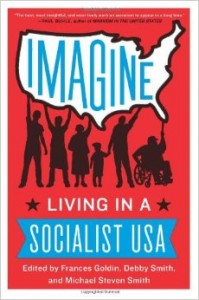
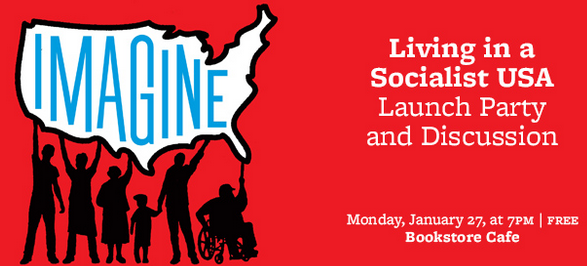
Imagine: Living in a Socialist USA-Frances Goldin, Michael and Debby Smith
Our own co-host Michael Smith, his wife Debby and Frances Goldin have assembled and edited an anthology of powerful essays titled Imagine Living In A Socialist USA. Prominent thinkers, activists and artists have given their perspective of what the United States would look like through the lens of a socialist society. This new work is an important contribution to what we hope will be a broader movement. It includes an indictment of capitalism, an alternative U.S.A. and how to get there.
Frances Goldin:
- It was my brainchild because I wanted to accomplish 3 things before I joined by ancestors. One is everyone who lived in Cooper Square who had been fighting Robert Moses and saving their old tenements since 1959 its been a tremendous long struggle.
- This is the only community land trust in the Northeast. The only one.
- The next one is that I was really distressed at the direction our country was moving. Here I am 89 years old and all of a sudden North Carolina says that we’re going back to the old days where you had to bring in your right arm and read the Constitution without missing a word in order to vote. That plus spying on every American and continuing the wars.
- It was just breaking my heart. I was very distressed that everybody thought that socialism was a dirty word, it was an undemocratic terrible way of life and they just didn’t have a clue as to what it really meant.
- I thought it would be a great idea to pull together some of the greatest minds in the country and let them talk about health, education, welfare, homosexuality, every subject that effects American’s lives and explain how it would be different under socialism if it were democratically done, which is the only way it should be done.
- Within one year, 31 leading brains in the United States for no charge, they did it free, wrote their essays on each one of these subjects. The book is in my hand, its finished and its beautiful and it makes me so happy. That’s my second accomplishment.
- The third one is to see one of the leading intellectuals in the world free, forever free. Mumia Abu-Jamal.
- I couldn’t do it alone, it was a great plan and so I leaned on to dear friends, Debby and Michael Smith.
- I had to force Harper Collins into this, they really didn’t want to do it.
- We were very lucky to hire an incredibly good editor, whose livelihood was editing for magazines and newspapers. If a sentence was too long, he cut it into 2 or 3 sentences.
- Right now, the word socialism, people think of dictatorship, they think terrible things, they think undemocratic.
- This is a simple instruction about how it would effect us with regard to health, education, housing, welfare, all of those subjects which make it so difficult for all of us to live.
- It can’t be a dirty word, it happens to be the most democratic way of governing possible.
- Get the workers to run the company. It’s happening in Spain, with dozens of corporations that have become worker owned.
- It’s going to be the workers dividing the profits among themselves.
- It will only happen when the workers are angry enough and informed enough to know that they can run the show.
- Every penny of the royalties will go to free Mumia Abu-Jamal
- We are not earning one dime from this book. It was a labor of love. It was a labor of activism.
- It was a labor to change the world and make it a better place.
Guest – Frances Goldin is the President & Principal of Frances Goldin Literary Agency. Frances has worked in publishing for 63 years, as an agent and as editor-in-chief of a children’s publishing company; she founded the Frances Goldin Literary Agency and sold her first book in 1977. Authored by Black anthropologist Betty Lou Valentine and titled Hustling and Other Hard Work, the book continued to receive royalties for 32 years. One of the agency’s strengths is that many of its books continue to earn royalties long after publication. Reflecting Goldin’s radical politics, the Agency concentrates on literary fiction and serious, controversial, progressive non-fiction.
—–
Attorney Michael Smith:
- I don’t think its a dirty word, because people see what’s going on under capitalism and they don’t like it. The economic situation in this country ain’t gonna change, its only going to get worse.
- Frances is quite an influential literary agent in this country.
- What’s your definition of socialism? I said a democratic economy and political system, both where people from the bottom up control how we make a living, and how we live.
- We’re having a book launch on January 27. It’s at 126 Crosby Street in SOHO at the book store called Housing Works.
- In order to achieve the kind of socialism we’re talking about and that’s socialism from the bottom up you need a broad democratic movement of people.
- All the left wing parties, all the movement groups, we gotta get together around a common program.
- One of the chapters that I really like, and this isn’t to flatter you Michael Ratner, but you wrote a chapter on what I would do if I was US Attorney General.
- Paul LeBlanc writes his chapter about the 3rd American revolution. Diane Feeley writes about that in her chapter. She’s an auto worker retired from Detroit.
- Michael Zweig, the great sociologist, we reprint his speech from Occupy Wall Street where he talks about the 1 percent, the ruling class.
- He says actually its 1/10 of 1 percent. Those are the people who are the top of the economy and different organizations in this country. He said, you gotta be very careful, because these people will kill ya.
- In the second part of the book, we emphasize use your imagination. How do we organize the economy democratically?
- How do you organize a corporation democratically? Rick Wolff wrote that chapter.
- There are 31 chapters in the book. The last chapter suggests itself. How do we do it?
- We’re not against leadership, we’re against undemocratic leadership but you need people who’ve had some experience and who can draw the lessons of the past.
Guest – Attorney Michael Smith is co-host of Law and Disorder, and a New York City attorney and author. His most recent book, written with Michael Ratner , is Who Killed Che? How The CIA Got Away With Murder. He is on the boards of the Center for Constitutional Rights, and the Brecht Forum. He was educated at the University of Wisconsin in the 1960s, where he learned social history from the great teacher Harvey Goldberg. He has testified on Palestinian rights before committees of the US Congress and the United Nations.
Guest – Debby Smith is a long time socialist since going to college in Boston during the radical sixties. Debby worked full-time for the anti-Vietnam War movement, the Kent State Legal Defense Fund and in the feminist, union and socialist movements. She is also the wife of Michael Smith and participates in the anti-capitalist and pro-democracy movements that are growing rapidly in the United States and worldwide.
————————————————————————————————————
Civil Liberties, Criminalizing Dissent, Extraordinary Rendition, FBI Intrusion, Guantanamo, Habeas Corpus, Human Rights, Political Prisoner, Prison Industry, Supreme Court, Surveillance, Targeting Muslims, Torture, Truth to Power, War Resister
Podcast: Play in new window | Download
Updates:
- Judge Leon Rules That NSA Meta Data Collection Is Likely Unconstitutional.
- Michael Ratner: It Could Be The Deathknell For This Kind Of MetaData Collection
- Ed Snowden’s Response To Judge Leon’s Decision
- Ed Snowden’s Open Letter To The People Of Brasil
- A Christmas Card From Chelsea Manning
- Guantánamo Five: Military Commissions – Their Torture Memories Are . . Classified.
- First Commander Lenhardt: Guantánamo Should Never Have Opened
- American Studies Association Supports Boycott Of Israeli Academic Institutions
——
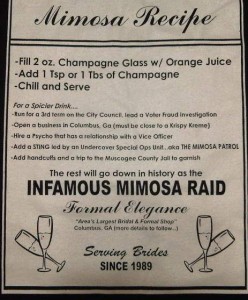

Over Policing of America: The Criminalization of Everyday Life
In his recent article titled Over Policing of America, attorney Chase Madar outlines a familiar narrative such as the militarization of police, stop and frisk, and how students get swept into the school to prison pipeline. The pattern is clear and who benefits is obvious in the list of over policing examples compiled by our returning guest, such as criminalizing immigration and how simple economic transactions are closely scrutinized by under-cover police.
Attorney Chase Madar:
- I’m hoping this new term will enter the national lingo; over-policing.
- What I wrote about is how the police paradigm has entered the DNA of social policy across the board in the United States in matters that a generation ago would not require police or prosecutors or criminal law, now suddenly do.
- That’s in education, in immigration, in family law, even how we regulate the economy.
- All of these spheres, domains of everyday life are increasingly regulated by police and prosecutors.
- A creeping police state. We need to take a very sobering look at how we’re governing ourselves and how criminal law is displacing and devouring all other kinds of social regulation.
- You see this more and more disciplinary matters in schools get outsourced to police departments.
- Police people are trained to respond to crimes, and to respond to everything as a crime. That’s the nature of police.
- When you send police into a school, the crime is going to sky rocket.
- Even the way we regulate our economy is suffering from an overdose of criminal law and police powers.
- What we have frequently is white collar work getting criminalized by a mare’s nest of criminal laws that are very complex, very difficult to understand.
- It’s not like we have a great financial system that was abused by a few bad apples. We have a really crappy system that’s legal because these people write the laws.
- Immigration law was mostly under the domain of administrative law with milder penalties, civil penalties.
- We’re kidding ourselves if we pretend that’s somehow aberrational.
- Although our political class seems incapable of doing anything constructive about it, they are very adept at channeling all fears about security in any sense into criminal law crack downs and ratcheting up the police state.
- Our incarceration rate is three times higher than the old East Germany.
- I think we need to switch very swiftly to alternative ways of social policy in holding our society together other than throwing cops and prosecutors at it.
Guest – Attorney Chase Madar , a TomDispatch regular and author of a new book, The Passion of Bradley Manning (OR Books). Madar tweets @ChMadar. He’s a contributor to the London Review of Books and Le Monde diplomatique and the author of a new book, The Passion of Bradley Manning (OR Books).
——————————————————-
Books From Law and Disorder Hosts
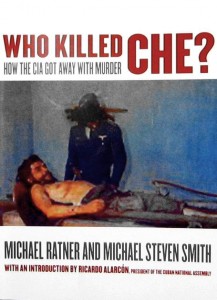
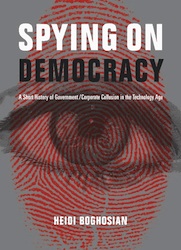
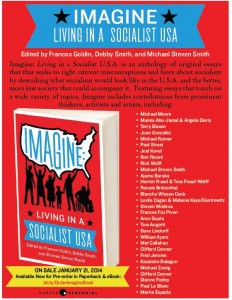
Afghanistan War, CIA Sponsored Terror, Civil Liberties, Criminalizing Dissent, FBI Intrusion, Guantanamo, Habeas Corpus, Human Rights, Political Prisoner, Prison Industry, Supreme Court, Surveillance, Targeting Muslims, Torture, War Resister
Podcast: Play in new window | Download
Updates:
—–
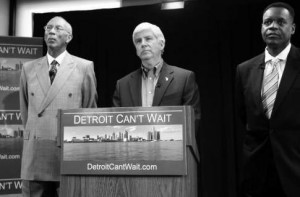
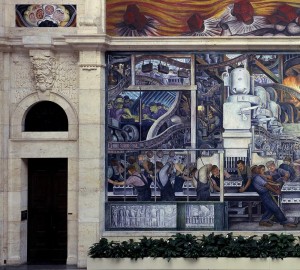
Judge Ruling Allows Detroit Bankruptcy To Move Forward
This summer we spoke with retired auto worker and activist Dianne Feeley about the plans to wipe out the pensions and health benefits of all current and retired city workers by emergency manager of Detroit, Kevyn Orr. We also looked at the history of workers in Detroit from the perspective of black workers and the broader pattern of oppression. Last week, a ruling by Judge Stevens W. Rhodes of the U.S. Bankruptcy Court allows the city of Detroit to move forward in the bankruptcy process. The cradle of the American auto industry will now be allowed to pay off debts and restore essential services.
Professor Laura Bartell:
- It is the first time that a bankruptcy judge that pension obligations constitute contractual obligations that are subject to diminution in bankruptcy.
- Although its rattled pensioners nationwide, its really not that extraordinary.
- The healthcare was never protected by the Michigan Constitution. Everyone has always known that healthcare was subject to modification by the city.
- The cuts in health care are going into effect I believe in February for city employees.
- When we’re talking about the pensions we’re talking about the retirees both the firefighters and policemen unions retirees.
- The city maintains that the plans are underfunded by 3.5 billion dollars.
- The union believes that number is vastly inflated based on projected returns that are too low. Whatever the number is its somewhere between 800 million and 3.5 billion.
- The policemen and firefighters don’t have the benefit of social security.
- You’re not talking about a lot of money going to any individual so if you cut the pension to any particular individual its obviously going to be a major cut for that individual.
- The major problem that Detroit has suffered was a vast decline in population.
- It used to be a much larger city. It’s footprint is still a very large city but the number of people living in that footprint is much smaller than it used to be.
- Among that small population there’s an even smaller number of people actually working and paying taxes.
- So the money coming in to meet the obligations of Detroit has been constantly shrinking.
- Detroit’s obligation to retirees in terms of pensions and healthcare is up at 38 percent and rising constantly. – and in addition we had severe mismanagement of city government including criminality. I’m sure everyone knows our former mayor is now in prison.
- My guess is the pensioners will be hit far less severely than the bond holders. Bond holders are making an investment and taking a risk.
- That’s what bankruptcy is about is all people who have done something to become creditors to the city and they’re not going to get what they deserve.
- That’s the problem, everybody is deserving, everybody should get paid.
- The problem is not that the governor has suddenly taken away the democratic rights of Detroit. We’ve had an emergency manager law for many years in the state of Michigan.
- Detroit is the latest and the biggest to have that happen.
- The next stage is a presentation of a plan of adjustment which he will present to creditors at the end of this month and file with the court at the beginning of January.
Guest – Professor Laura Bartell, after graduating from Harvard Law School, where she was an officer on the Harvard Law Review, she clerked for Judge Alvin B. Rubin of the U.S. Court of Appeals for the 5th Circuit in New Orleans. She then entered practice in New York where she became a partner in Shearman & Sterling, specializing in bank financing and bankruptcy work. She is a member of the American Law Institute and American Bankruptcy Institute and has published articles on bankruptcy topics, federal court-awarded attorneys’ fees and costs, and the attorney/client privilege and work-product doctrine. She teaches Property, Secured Transactions, Bankruptcy and Creditors’ Rights and Effective Oral Communication for Lawyers.
—–
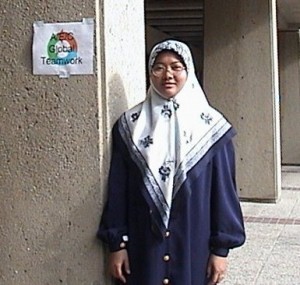
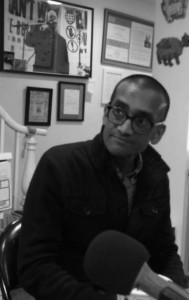
Terrorist Watch Lists and No Fly Lists Cases
How do governments compile lists called no-fly lists of individuals often placed on terrorist watch lists? As we’ve seen, the predictions about individual behavior of Muslims, Communists or Japanese-Americans have often been wildly inaccurate and cause a great deal of harm to these communities. Today to discuss the no-fly list and a recent case proceeding through the courts is returning guest Shane Kadidal senior managing attorney of the Guantánamo Global Justice Initiative at the Center for Constitutional Rights in New York City.
Attorney Shane Kadidal:
- There are broad watch lists and there are lists that people are more familiar with in concept and that’s what being litigated out in California, somebody placed on the no-fly list.
- There are two kinds of no-fly lists, there’s the selectee list where some where on the order of tens of thousands of people are designated for additional security checks when they go through the TSA.
- Then there’s the smaller list which contains several thousand names that sometimes you hear referred to as the no transport list. That’s people who can’t board a flight under any circumstances.
- The US shares its list at times with other countries. We don’t know how much sharing exists.
- The case in California is super interesting because the person who got stopped doesn’t seem like the kind of person that would get stopped except for the fact that she wears a hijab.
- The Terrorism Screening Center is responsible for putting people on the list.
- The interesting thing about this case is that daughter that was put on the list was 14, eight or nine years ago and is now a lawyer in Malaysia and was supposed to testify and was told by Malaysian airlines you are on the no-fly list.
- She’s seeking damages because she couldn’t fly back. This is really the first case to get to trial basically.
- The ACLU has a challenge to which kind of a pure due process challenge case in a case called Lateef v Holder.
- You got put on a list and there’s no real process for challenging those facts.
- If its an accidental match, somebody has the same name as you, or close to you. You can go through this challenge procedure called TRIPP.
- If you win your challenge, they’ll give you a number that you can enter in when you buy your plane ticket.
- CCR along with the Clear Clinic at CUNY Law School filed a case at the beginning of October. The gist of it is that people will end up on the no-fly list and if you complaint about it the FBI will say, if you talk to us you can be taken off the list if you agree to work as an informant on the Muslim community.
- What’s interesting about the couple thousand names (no-fly list) which is much smaller than the number which are on these lists intended to intercept terrorism finance like the list the treasury department maintains like a 500 plus page phone book.
- You can imagine that there might be some logical rationale behind having a short list of people who get a little scrutiny and hope it has more due process than the selectee list has now.
- But the fact that there are some people who are not allowed to fly under any circumstances with any level of search scrutiny that doesn’t seem to make any sense and seems to fit very neatly into our complaint.
- I question if this list can make rational sense.
- Typically if you’re on the no-fly list you get turned away. Typically you don’t get arrested.
- OFAC list, is sort of a list of parties you’re not allowed to do business with. It combines not only sanctions directed at whole countries but also the variety of sanctions directed at terrorism finance.
- This is just like other cases where secrecy is at the core of the defense of the program.
Guest – Shane Kadidal, senior managing attorney of the Guantánamo Global Justice Initiative at the Center for Constitutional Rights in New York City. He is a graduate of the Yale Law School and a former law clerk to Judge Kermit Lipez of the United States Court of Appeals for the First Circuit. In his eight years at the Center, he has worked on a number of significant cases in the wake of 9/11, including the Center’s challenges to the detention of prisoners at Guantánamo Bay (among them torture victim Mohammed al Qahtani and former CIA ghost detainee Majid Khan), which have twice reached the Supreme Court, and several cases arising out of the post-9/11 domestic immigration sweeps. He is also counsel in CCR’s legal challenges to the “material support” statute (decided by the Supreme Court last term), to the low rates of black firefighter hiring in New York City, and to the NSA’s warrantless surveillance program.
——————————————————————————
Afghanistan War, CIA Sponsored Terror, Civil Liberties, Criminalizing Dissent, Guantanamo, Habeas Corpus, Human Rights, Political Prisoner, Surveillance, War Resister
Podcast: Play in new window | Download
Updates:
—-
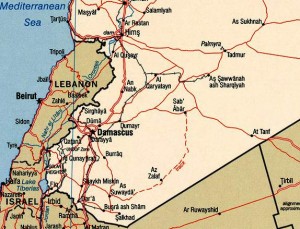
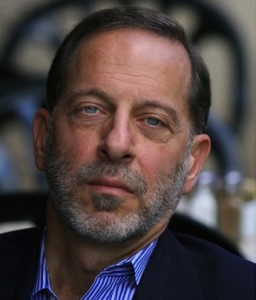
United States Moves To Intervene In Syria Civil War
According to the United Nations, nearly 2 million refugees have fled the civil war and unrest in Syria. Why is the United States moving to intervene? Professor Rashid Khalidi, an historian on the Middle East and the Edward Said Professor of Modern Arab Studies at Columbia University, and director of the Middle East Institute of Columbia’s School of International and Public Affairs joins hosts to discuss the history of the conflict and who stands to gain if the US intervenes.
Professor Rashid Khalidi:
- This is another case where the United States seems to me at least edging sideways blindly without understanding or thinking, frankly into another regional civil war which has the potential for developing into a regional conflict.
- We got involved in an Iraqi civil war, we helped create an Iraqi civil war after the occupation of Iraq. We created al-Qaeda and other horrible manifestations as part of the war against the Soviets and then got involved in what is in effect an Afghan civil war.
- The United States is about to and I hope I’m wrong, put its into a meat grinder and blindly, heedlessly push the button.
- This is a horrific conflict, with no good guys on either side. You have a horrific regime which very likely used these horrible weapons against the rebels and its own population.
- You have on the other side people who are not white knights, in fact they just as soon be killing Americans as butchering Shia or cutting the heads off people. Those are the forces that dominate. Not the opposition to the regime, but the fighting forces.
- These are people who don’t wish any of us well.
- The United States is going to war for reasons of imperial overreach, for reasons that have to do with domestic politics.
- For Iran, the Syrian regime is its most important regional ally. The Iranians see this as a make or break conflict for their regional influence.
- At the same time the new Iranian government is clearly interested in cutting a deal with the United States.
- I think a deal is within reach on nuclear issues and other issues.
- Israel would probably like to see the Syrian side bleed themselves endlessly.
- What they’re probably doing is through their supporters in this country, is quietly pushing this president toward an American intervention which is not in the American national interest but in some ways.
- I was there when he said, ‘I’m not against all wars, I’m against stupid wars.’ This is quintessentially a stupid war.
- It’s the fifth or the eighth move on each side that has the potential for escalation.
- There is a consensus of idiocy among the so-called experts.
- I have to say this, the Israelis encouraged this.
- It’s a civil war with a lot of bad guys on both sides. That is what we’re about to get directly involved with.
- Why the United States should be against the Assad regime, its a bad regime, is unclear to me, while its clear to me Israel would like a bunch of tiny, weak, divided, sectarian states such that it could lord over the region completely.
- Most people in the Arab world have a profound suspicion of the United States, because its joined at the hip with Israel, always, everywhere since time immemorial.
- On the other hand you have authoritarian regimes, petro-monarchies, Saudi Arabia, the Emirates, Kuwait, Qatar which are hell bent on imposing their regime on Syria.
- There are a lot of interests tied up in the United States lording it over everybody and acting as if it has the right and the power to decide everything everywhere. We don’t.
Guest – Professor Rashid Khalidi, is the Edward Said Professor of Arab Studies at Columbia University. He received his B.A. from Yale University in 1970, and his D.Phil. from Oxford in 1974. He is editor of the Journal of Palestine Studies, and was President of the Middle East Studies Association, and an advisor to the Palestinian delegation to the Madrid and Washington Arab-Israeli peace negotiations from October 1991 until June 1993.
—–


Spying on Democracy: Government Surveillance, Corporate Power, and Public Resistance
Our own Heidi Boghosian has written a powerful book on the history of spying, privacy and how public dissent without surveillance is needed in order for a democracy to thrive. The newly published book is titled Spying On Democracy: Government Surveillance, Corporate Power, and Public Resistance and it reveals in detail how the government acquires your information from sources such as telecommunications companies to compile a data base on “persons of interest.” Since ex-CIA staffer Edward Snowden’s release of top secret documents to the Guardian and Washington Post many are now aware of the frequency and scope to which they are being monitored. What this book has unveiled is how your personal consumer data is being gathered, bundled and sold. The spying, the collecting of phone records, accessing your online activity, all of it is unconstitutional says Heidi Boghosian, co-host of Law and Disorder and the National Lawyers Guild’s Executive Director.
Attorney Heidi Boghosian:
- They create dossiers of our spending habits, of our communication habits.
- The corporations benefit from this which makes them create more equipment for surveillance and almost makes it impossible for the government to perform traditional government functions because they’re so reliant on corporate partners.
- There’s also a revolving door among CEOs of these big companies and high level positions within government intelligence.
- The National Lawyers Guild was spied on by the FBI. More than 1000 agents were assigned to us for nearly 3 decades. They rummaged through our members garbage. We had an infiltrator in Washington DC serving as a staff person.
- They tried to label us (and failed) as a subversive organization.
- The People’s Law Office had also been monitored for years. Apparently across the street from the office an apartment was taken by the FBI who spied on them for their work representing politically active individuals.
- With all of this spying, the chilling effect of knowing that you may be spied on, you conversations may be listened to, changes the way you do business.
- I’ve always been interested in cooperation between municipal public police and private security organizations.
- We’re seeing an entire industry giving birth to Stratfor and other intelligence organizations that exist just to conduct intelligence be it on activists or critics of corporate or government policies, as well as defense contractors beefing up and creating a whole sector of intelligence.
- They are in big contracts with the US government.
- One of the problems constitutionally is they’re not held as private businesses to the same strictures as the US Constitution as we saw recently with the Hemisphere program revelations. We have our government paying AT&T staff to sit next to drug enforcement officers and go through AT&T’s files that go back 26 years. They’re not overseen by a judge.
- My question is how many more agencies of the government are doing this?
- They are getting access to this information through what’s called administrative subpoenas.
- Many mannequins have small cameras embedded in the eyeballs.
- When you’re spying on the fourth estate as its called which is intended to be a watch dog on government you really get to the heart of what democracy is about.
- Without a free press, we don’t have any chance of preserving those fundamental freedoms of First Amendment association and the ability to bring our grievances to the government for redress.
- A student group working with the Coalition of Immokalee Workers got suspicious because a new member on their listserve started asking questions and they did some research and found she owned her own private security company, in fact she was spying on them for Burger King.
- Congress is calling for an investigation for these large data aggragators. Once again, there’s no oversight, there’s no accountability, they go to a variety of sources to gather personal information on us. Some in the public domain, others not.
- They have vast troves, electronic dossiers on each of us.
Guest – Heidi Boghosian, executive director of the National Lawyers Guild. She is the co-host of the weekly civil liberties radio show Law and Disorder on Pacifica’s WBAI in New York and over 40 national affiliates. She received her JD from Temple Law School where she was the editor-in-chief of the Temple Political & Civil Rights Law Review. She also holds an MS from Boston University and a BA from Brown University.
——————————————————-
CIA Sponsored Terror, Civil Liberties, Crony Capitalism, Guantanamo, Habeas Corpus, Human Rights, Military Tribunal, Political Prisoner, Prison Industry, Prosecution of the Bush Administration, Supreme Court, Surveillance, Targeting Muslims, Torture
Podcast: Play in new window | Download
Updates:
- Prisoner’s Hunger Strike: Pelican Bay Prison, Guantanamo Bay Prison, Palestinians In Israeli Prisons
- CCR Lawsuit – Pelican Bay Prisoner Class Action
- 20 Plus Palestinians On Hunger Strike In Israeli Prisons Demand Better Conditions For Pelican Bay Prisoners
- Federal Judge Gladys Kessler Says the President Is The One To Stop Force Feeding and Release Cleared Guantanamo Bay Detainees
- Bradley Manning Trial: Important Proceedings During Defense Case At Ft Meade, Maryland
—-
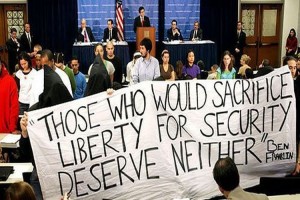

Secret Federal FISA Court Advocate of National Security State
Here on Law and Disorder we’ve discussed the process of the US government expanding its power to get wiretapping permission from the Foreign Intelligence Surveillance Court or FISA court. This is under a provision called section 215 of the Patriot Act which if listeners might recall was set to expire in 2009. It did not. We discussed how the FISA court will be accessed by what’s called Lone Wolf Authority or National Security Letter Authority whereby the FBI can write a letter to the court without suspicion of terrorism and get bank, telephone and internet records.
The 11-member FISA Court has been central to allowing a massive surveillance state to exist by granting US agencies such as the NSA access to private telecommunication data. Today, the FISA court essentially operates as an advocate for the national security state. It’s judicial oversight now parallels the Supreme Court. But more troubling, these FISA Court Justices operate in complete secrecy and base their decisions from hearing only one side the argument, the US government’s.
Attorney Scott Horton:
- The Nixon Administration attempted to use “intelligence gathering” as a justification. Congress reacted to that by saying we’re not going to agree that the government has the right to wiretap people in the United States on the grounds of intelligence gathering. We’re going to require this judicial check, so Congress created this special court the FISA court.
- The court has been around for a long time, but its become a far more significant entity doing much more work after 9/11.
- It has 11 judges. The judges are selected by the Chief Justice of the Supreme Court, John Roberts.
- The judges are picked from courts all around the country.
- It’s not a secret court in that we know that it exists. It IS a secret court in that it operates in secret.
- Literally, the public doesn’t know what papers are filed with it and doesn’t know about its decision.
- That’s a highly controversial matter because decisions by federal courts constitute law.
- This means that this court is manufacturing secret law that the people don’t know about.
- We don’t know the jurisprudence of this court, we don’t know its decisions, we don’t know the full rationale for all its decisions because most of them have been secret.
- It is very aggressively expanding the power and authority of the NSA in surveillance areas.
- This is a court picked by Roberts who share his attitude. Out of 11 judges we have 10 Republican appointees. It’s very well known that Roberts in making appointments here looks very closely to select only judges who reflect his attitudes about the national security state.
- It is a cherry picked court. A movement conservative perspective which is quite hostile to civil liberties.
- The court has become an advocate for national intelligence services.
- It really puts the whole institution of the court under a cloud right now.
- If you want to disperse that cloud you would make sure those judges are representatives of the country.
- The legal reasoning and interpretation of statutes that should be there for people to see and know and understand and criticize.
- Telecoms: Here they are service providers dealing with consumers, lying to their clients and allowing the government free access to all this information.
- That is a criminal act under various statutes of states including New Jersey and Maine. That have rules that say they may not allow governments, investigators access to this information other than pursuant to a government subpoena or court order.
- This court is sweeping away core rights and making a joke out of the 4th Amendment.
- Whistle-blower damage control strategy: A program to deflect attention from the disclosures themselves.
- There is a move afoot to take this out on the American service providers who cooperate with the NSA, Verizon, AT&T. . .Google and so forth.
Guest – Scott Horton, human rights lawyer and contributing editor to Harper’s Magazine. Scott’s column – No Comment. He graduated Texas Law School in Austin with a JD and was a partner in a large New York law firm, Patterson Belknap Webb & Tyler.
—-
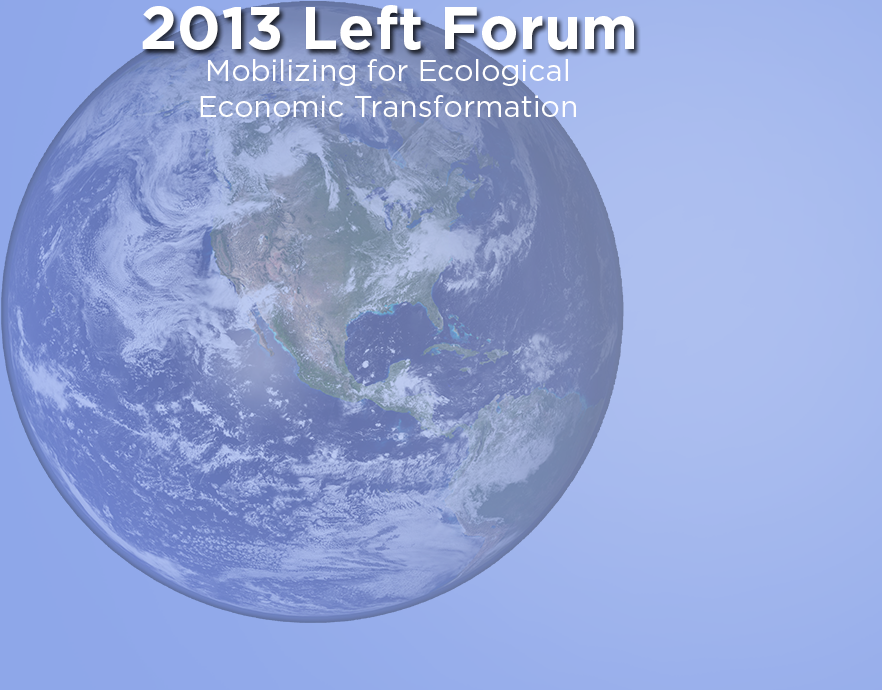
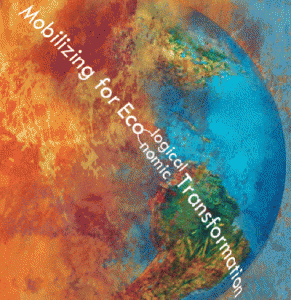
Left Forum 2013: Ron Reosti
Capitalists are not necessary to run firms, nor to run macro-economies and investment says Ron Reosti in his presentation at the Left Forum Panel titled Imagine Living In A Socialist USA, Part 2: Making The American Socialist Revolution.
Speaker – Ron Reosti, his Italian parents imparted to him a working-class identity, a sense of social justice, a belief in the possibility of social change, a commitment to democracy, and a hatred of the undemocratic ruling class. He embraced socialism in his early teens, during the McCarthy era, and has remained committed to that vision. He practices law and is part of the radical community in Detroit.
———————————————-
Afghanistan War, CIA Sponsored Terror, Civil Liberties, Criminalizing Dissent, Cuba, Extraordinary Rendition, FBI Intrusion, Guantanamo, Habeas Corpus, Human Rights, Political Prisoner, Surveillance, Targeting Muslims, Torture, War Resister
Podcast: Play in new window | Download
Updates:
- A Phone Call To Save Lynne Stewart’s Life:
- Attorney General Eric Holder – 1 202 514 2001
- White House President Obama – 1 202 456 1414
- Federal Bureau of Prisons – Director Charles Samuels – 1 202 307 3198 ext 3
—-


Jeremy Hammond, Bradley Manning and Julian Assange: Michael Ratner
Michael Ratner discusses attending Jeremy Hammond guilty plea in open court last month, Bradley Manning’s trial that starts June 3, 2013 at Fort Meade and how a Fox News reporter feels the same chilling effect of free speech by having his investigative work under suspicion as co-conspirator or aiding and abetting.
Jeremy Hammond: “Now that I have pleaded guilty it is a relief to be able to say that I did work with Anonymous to hack Stratfor, among other websites,” according to a statement released by Hammond on Tuesday. “Those others included military and police equipment suppliers, private intelligence and information security firms, and law enforcement agencies. I did this because I believe people have a right to know what governments and corporations are doing behind closed doors. I did what I believe is right.”
- Jeremy Hammond pleaded guilty to one count of conspiracy to access a protected computer.
- It’s under the Computer Fraud and Abuse Act.
- Jeremy Hammond was facing 32 years to life. He could be sentenced to up to 10 years.
- Interestingly, Wikileaks doesn’t appear in what he pleaded to. He or the group uploaded some 5 million emails.
- One of the emails is about a sealed indictment on my client and CCRs client Julian Assange.
- Julian Assange: Jeremy is a political activist and whistle-blowing is one of the means he uses for political activism.
- Bradley Manning pleaded guilty to 20 years in prison already. The key crime they’re trying to get Bradley for is aiding the enemy.
- The government is sledge hammering any criticism from a military person.
- Petition for Jeremy Hammond
Law and Disorder Co-host Attorney Michael Ratner, President Emeritus of the Center for Constitutional Rights (CCR), a non-profit human rights litigation organization based in New York City and president of the European Center for Constitutional and Human Rights (ECCHR) based in Berlin. Ratner and CCR are currently the attorneys in the United States for publishers Julian Assange and Wikileaks. He was co-counsel in representing the Guantanamo Bay detainees in the United States Supreme Court, where, in June 2004, the court decided his clients have the right to test the legality of their detentions in court. Ratner is also a past president of the National Lawyers Guild and the author of numerous books and articles, including the books The Trial of Donald Rumsfeld: A Prosecution by Book, Against War with Iraq and Guantanamo: What the World Should Know, as well as a textbook on international human rights.
—–
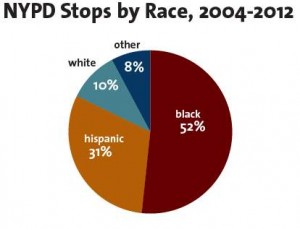
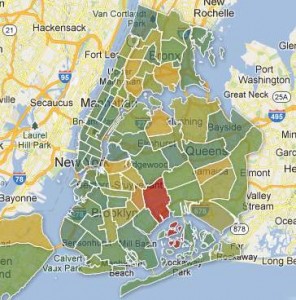
Stop and Frisk Lawsuit Closing Arguments
Closing arguments were heard on both sides last week on the Stop and Frisk case known as Floyd v. City of New York. This is a class-action lawsuit challenging the NYPD’s unconstitutional stop-and-frisk policy. The case charges the NYPD with a policy and practice of unreasonable, suspicion-less and racially discriminatory stops in violation of the Fourth Amendment’s prohibition against unreasonable searches and seizures and the Fourteenth Amendment’s Equal Protection Clause barring racial discrimination.
Stop and Frisk has increased over 600 percent in New York City. In 2009 New York City, a record 576,394 people were stopped, 84 percent of whom were Black and Latino residents — although they comprise only about 26 percent and 27 percent of New York City’s total population respectively. Ten years of raw data obtained by court order from the New York City Police Department (NYPD) showed that stop-and-frisks result in a minimal yield of weapons and contraband.
CCR Senior Staff Attorney Darius Charney:
- The closing was really interesting because the judge asked a lot of questions of both sides.
- It was more like an oral argument as you would do in an Appeals Court.
- This was a bench trial, there was a judge but no jury.
- Because of that the judge herself took the role of asking a lot of questions of witnesses.
- I think the police departments’ at least public position on this is really a problem created by a bunch of left wing lawyers and the media.
- In our class action (8 years) there have been over 4.5 million recorded stops by the police department but the actual number of stops are probably higher. About 90 percent of that 4.5 million there is no discovery of criminal activity – 90 percent are released and not given a ticket.
- The police department claims the focus of this program is to get illegal guns off the street about .13 percent results in the recovery of a gun.
- You actually find a gun one or two times out of a thousand.
- Reasonable, articulatable suspicion which the Supreme Court set out about 45 years ago – Terry v Ohio.
- (NYPD) they were very frank about it and sincere when they said – Look most reported crime is black or latino suspect
- If you’re talking about individualized suspicion just because someone happens to be the same race as crime suspect doesn’t make them suspicious.
- The two most common reasons these police officers are checking off on the forms for why they stop people is furtive movements and high crime area.
- They’ll try to muddy the waters by trying to mischaracterize what it is we’re actually complaining about. How can you criticize us for sending more police officers to high crime neighborhoods.
- What we’re complaining about is how officers behave there and how they treat the people who live there.
- Opening statements: It’s difficult to try to synthesize that much evidence into an hour and a half.
- This fight really goes back 14-15 years to the late 90s and what happened after the murder of Amadu Diallo.
- The first lawsuit that they did, the Daniels Case came about because of the work of grassroots organizations.
- Communities United For Police Reform
- We anticipate by July we will know what she (the judge) will decide.
- We learn the lesson if you leave it up to the police department and this mayoral administration to change things on their own, they’re not going to do it because they think what they’re doing is right.
Guest – Attorney Darius Charney, senior staff attorney in the Racial Justice/Government Misconduct Docket. He is currently the lead counsel on Floyd v. City of New York, a federal civil rights class action lawsuit challenging the New York Police Department’s unconstitutional and racially discriminatory stop-and-frisk practices, and Vulcan Society Inc. v. the City of New York, a Title VII class action lawsuit on behalf of African-American applicants to the New York City Fire Department which challenges the racially discriminatory hiring practices of the FDNY.
—
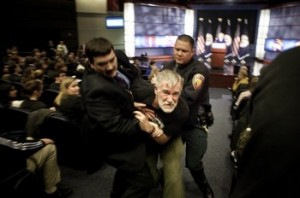
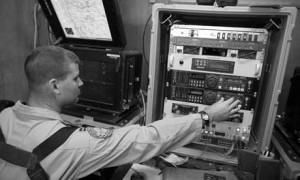
Doubting Obama’s Resolve To Do Right: Ray McGovern
We continue our discussion on killing people using drone warfare with returning guest Ray McGovern. When President Obama delivered a major speech on counter-terrorism, he announced a shift in his administration’s use of drones. The Obama Administration has conducted hundreds of drone strikes in several countries, killing civilians and so far reported, four US citizens. Critics point out that as the Obama Administration assassinates its’ suspects, it also avoids the legal complications of detention. London based bureau for investigative journalism estimates that about 830 civilians including women and children may have been killed by drone attacks in Pakistan. 138 in Yemen, and 57 in Somalia.
Former CIA analyst Ray McGovern:
- It was a masterpiece of oratory and rhetoric, but it was deceptive through and through.
- Those of us who had been watching this know he lied through his teeth on many occasions.
- He has the power as we all know to release 86 prisoners (Guantanamo) in the next hour.
- Why would he do all that? Why would he be afraid to take the drones away from the CIA?
- Well, I’ve come to the conclusion that he’s afraid. He’s afraid of what happened Martin Luther King Jr.
- At a small dinner with progressive supporters – after these progressive supporters were banging on Obama before the election . . . Why don’t you do the things we thought you stood for? Obama turned sharply and said Don’t you remember what happened to Martin Luther King Jr.?
- I’m convinced the President of the United States is afraid of the CIA.
- Does he have any reason to fear the CIA? Well he sure as heck does. For those of your listeners who have not read James Douglas’ JFK and the Unspeakable, you need to read that, because it’s coming up on 50 years.
- John Kennedy signed 2 executive orders just a month or so before he was killed. One of them said we’re pulling out a 1000 troops from South Vietnam. The other said we’re pulling out the bulk of the troops by 1965, we’re finished in Vietnam.
- I think he’s just afraid and he shouldn’t have run for president if he was going to be this much of a wuss.
- My father was professor of law at Fordham University for about 35 years. My daughter, my brother, their all lawyers. I have this notion that when someone comes in after building a record against torture and kidnapping, and black sites, and they come in and say we think this is bad but nobody should be prosecuted for it. .
- It’s not a dichotomy here, it’s deliberate duplicity with a rhetorical flourish.
Guest – Raymond L. McGovern, retired CIA officer turned political activist. McGovern was a Federal employee under seven U.S. presidents in the past 27 years. Ray’s opinion pieces have appeared in many leading newspapers here and abroad. His website writings are posted first on consortiumnews.com, and are usually carried on other websites as well. He has debated at the Oxford Forum and appeared on Charlie Rose, The Newshour, CNN, and numerous other TV & radio programs and documentaries. Ray has lectured to a wide variety of audiences here and abroad. Ray studied theology and philosophy (as well as his major, Russian) at Fordham University, from which he holds two degrees. He also holds a Certificate in Theological Studies from Georgetown University.
————–
Law and Disorder March 3, 2010
JFK and the Unspeakable: Why He Died and Why It Matters by Jim Douglass
Jim Douglass:
- John F. Kennedy’s experience in WWII: He was in the South Pacific, he volunteered. He was on that PT boat.
- What happened on that PT boat, is that it got split into two by a Japanese destroyer. He lost brothers and friends at that time. An extraordinary experience being adrift on the ocean warning other PT boats. The experience create a distrust in military authority.
- He said that he wanted to splinter the CIA into a thousand pieces and scatter to the winds.
- As Kennedy said to his friends, “they figured me all wrong.”
- The Unspeakable: the kind of evil and deceit that seems to go beyond the capacity of words to describe. The midst of war and nuclear arms race, the assassinations of Kennedy, Martin Luther King and Malcom X that the term was used.
- JFK’s vision is articulated in the address June 10, 1963, arising from the turnaround of the missile crisis and Bay of Pigs.
- He wanted to move step by step into a disarmed world. Nikita Khrushchev put that speech all over the Soviet Union. The Cuban Missile Crisis is a deeply misunderstood part of our history, because it’s usually portrayed as Kennedy going to war with Nikita Khrushchev and beating him.
- The truth was that Kennedy and Nikita Khrushchev were in over their heads, the US generals wanted nuclear war, because they had more warheads than the Soviets.
- Nikita Khrushchev: We now have a common enemy from those pushing us toward war.
- At that point the Cold War turned upside down because Kennedy and Khruschev became closer to each other than either was toward their own military power system.
- Vietnam: Kennedy’s military people would not give him an exit policy. He signed the withdrawal order from Vietnam before he was assassinated.
- His friends said that he had an obsession with death. It was not an obsession but a real assessment that he was going to die. If you try to turn around a national security state that is dominating the world,
- and you do so as president of the United States, of course you’re going to die. Kennedy knew that.
- The book is a story on the deliberate destruction of hope, the vision of change, a turning of this country all of which was happening and had to be stopped. US Agencies killed Dr. Martin Luther King – 1999 Verdict
- We’re in the same scene right now with Petraeus and McChrystal setting up Obama. They were dictating terms to Obama, unlike Kennedy, he did not face them down.
- We need to get out ahead of Obama so that he can do something.
Guest – James W. Douglass, author and longtime peace activist.
————————————————————























